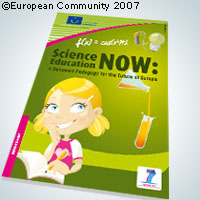Experts call for radical change in way science is taught
A radical new approach to science teaching is needed if we are to reverse European schoolchildren's declining interest in science, according to a report from the High Level Group on Science Education. The expert group was set up last year by EU Research Commissioner Janez Potocnik and Jan Figel', the Commissioner for Education, Training, Culture and Youth. It was tasked with identifying best practices that could increase young people's interest in science. Under the chairmanship of French MEP Michel Rocard, the group studied existing initiatives to boost pupils' interest in science, focusing in particular on the way science is taught in schools. The group's key recommendation concerns a reversal of school science teaching from mainly deductive to inquiry-based methods. The deductive approach to teaching entails the teacher presenting concepts, their logical implications and examples of applications. In contrast, in Inquiry-Based Science Education (IBSE), more space is given to observation and experimentation and the child, guided by the teacher, is encouraged to construct his or her own knowledge. According to the experts, IBSE has proven effective at increasing students' interest and attainment levels in science at both primary and secondary level. It is particularly effective for students with lower levels of self confidence and from disadvantaged backgrounds, yet it also creates the right conditions for the most able students to reach the deepest levels of knowledge. The group emphasises that the deductive and inquiry-based approaches are not mutually exclusive, and should be combined to accommodate the full range of pupils' mindsets. To support this move towards IBSE, the experts recommend support and training in order for teachers to use IBSE effectively together with the development of teachers¿ networks. The experts also recommend that priority be given to initiatives that will raise the participation of girls in science subjects, and boost their self-confidence in science. In this respect, the group found that where the IBSE approach is used, girls participate more enthusiastically in scientific activities. The report calls for better articulation between national activities and those funded at European level. They believe that the EU should contribute €60 million over 10 years to these activities. Finally, the experts call for the creation of a European Science Education Advisory Board, which, among other things, would monitor initiatives on IBSE and encourage them to cooperate and share information at the European level. The groups should be established and funded by the European Commission. Implementing these recommendations will require action at all levels. 'Because Europe's future is at stake decision-makers must demand action on improving science education from the bodies responsible for implementing change at local, regional, national and European level,' the group states. 'The issue should be given a central place in the Lisbon Strategy Renewal and be considered as an imperative priority.' 'The Rocard report makes very clear recommendations about the direction needed to revive science teaching in Europe,' commented Commissioner Potocnik. 'These recommendations need to be taken seriously - stimulating interest among Europe's young for science and technology [S&T] is crucial if Europe is to have a future based on the best use of knowledge.' 'Declining interest and recruitment into S&T studies must be a cause for concern for all,' added Commissioner Figel'. 'Attracting more young people to scientific and technological fields of study - and especially girls, who are underrepresented in most European countries - has become an objective that is shared at European level. But much remains to be done.'



